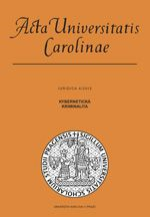Příprava, vznik a problémy spojené s euronovelou Ústavy ČR
Preparation, Formation and Problems Associated with the Euro-Amendment of the Constitution of the Czech Republic
Author(s): Petr MlsnaSubject(s): Law, Constitution, Jurisprudence
Published by: Univerzita Karlova v Praze, Nakladatelství Karolinum
Keywords: International treaties by the article No. 10a of the Constitution of the Czech Republic; international treaties; European Union; classification of international treaties; amendment of the Constitution No. 395/2001 Sb.
Summary/Abstract: This article is dedicated to the problems of preparation and formation of the amendment of the Constitution of the Czech Republic No. 395/2001 Sb. (Coll.), which is branded a “euro-amendment” of the Constitution of the CR. Essence of this amendment of the Constitution of the CR was comprehensive embedding and position of international treaties in the Czech legal system. One particular category of international treaties on human rights and fundamental freedoms was abolished and new unified conditions were created, by meeting of which an international treaty becomes a part of the legal system with application priority before a law. Main focus of this article are the problems of international treaties on integration by the article 10a of the Constitution of the CR, through the power of which some of the authority of the bodies of the CR are transferred to an international organization or institution. International treaties on integration are very difficult to classify. The key question is, when the transfer of authority to an international organization occurs and whether a constitution maker is able to identify this moment at all. The problem of interpretation of international treaties by the article 10a of the Constitution of the CR consists of a question whether, during their ratification, one should follow a purely formal procedure in accordance with the principle of procedural equivalence, or whether one should judge each particular international treaty, albeit mostly only on purely hypothetical level, to find out whether it constitutes a transfer of authority or a change of conditions for execution of authority, which the Czech Republic already has transferred to an international organization. The article also presents a comparative overview on what way the international treaties on integration are adopted in individual member states of the European Union. As an addition, this article also deals with the ruling of the Constitutional Court No. 403/2002 Sb. (Coll.), by which the Constitutional court extended interpretation of constitutional order on international treaties on human rights and fundamental freedom. The Constitutional Court has been using this category of international treaties as a reference criterion for judgement on constitutionality of laws and legal provisions till present. More detailed analysis of international treaties on integration also raises issue of definition of sovereignty of a modern state and its changes within integrating Europe. On the margins, this article also brings judicature of the Constitutional Court regarding position and judgement on the Lisbon treaty.
Journal: Acta Universitatis Carolinae Iuridica
- Issue Year: 59/2013
- Issue No: 4
- Page Range: 33-57
- Page Count: 25
- Language: Czech

